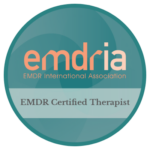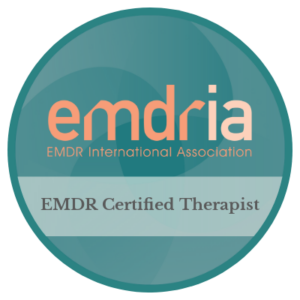EMDR 
What is EMDR Therapy?
Eye Movement Desensitization and Reprocessing (EMDR) therapy is an integrative psychotherapy approach that has been extensively researched and proven effective for the treatment of trauma. EMDR is a set of standardized protocols that incorporates elements from different treatment approaches.
What is EMDR trained vs EMDR certified?
EMDR training equips professionals with knowledge and skills to use EMDR therapy. EMDR training includes 10 consultation hours in order to effectively implement skills within the therapist’s practice.
VS
EMDR certification goes beyond basic training and additionally includes 20 hours of group and individual consultation hours, as well as at least 50 unique EMDR sessions. With a certified EMDR therapist you can ensure you are working with someone who is experienced, stays up-to-date on new and emerging changes within the technique, and upholds the highest standards for the clinical use of EMDR.
How does EMDR work?
EMDR therapy is an integrative psychotherapy and uses a technique called bilateral stimulation to repeatedly activate opposite sides of the brain. Therapists often use eye movements to facilitate the bilateral stimulation. These eye movements mimic the period of sleep referred to as rapid eye movement or REM sleep, and this portion of sleep is frequently considered to be the time when the mind processes the recent events in the person’s life.
EMDR seems to help the brain reprocess the trapped memories is such a way that normal information processing is resumed. Therapists often use EMDR to help clients uncover and process beliefs that developed as the result of relational traumas, or childhood abuse and/or neglect. For a more detailed explanation please visit EMDR Institute, Inc.
What does EMDR help?
EMDR had been originally established as helpful for PTSD, although it’s been proven useful for treatment in the following conditions:
- Panic Attacks
- Complicated Grief
- Disturbing Memories
- Phobias
- Pain Disorders
- Performance Anxiety
- Addictions
- Stress Reduction
- Sexual and/or Physical Abuse
- Body Dysmorphic Disorders
None of the above symptoms or experiences fit you?
Do you experience distressing emotions that appear to you, and perhaps to others, to be excessive given the current situation? Do you tend to be highly reactive to certain triggers? Is there one or more belief that you believe about yourself that on an intellectual level you know is not true?
If so, you may still be a good candidate for EMDR therapy.
Contact me today for a free phone consultation to see if EMDR might help you release what no longer serves you.


